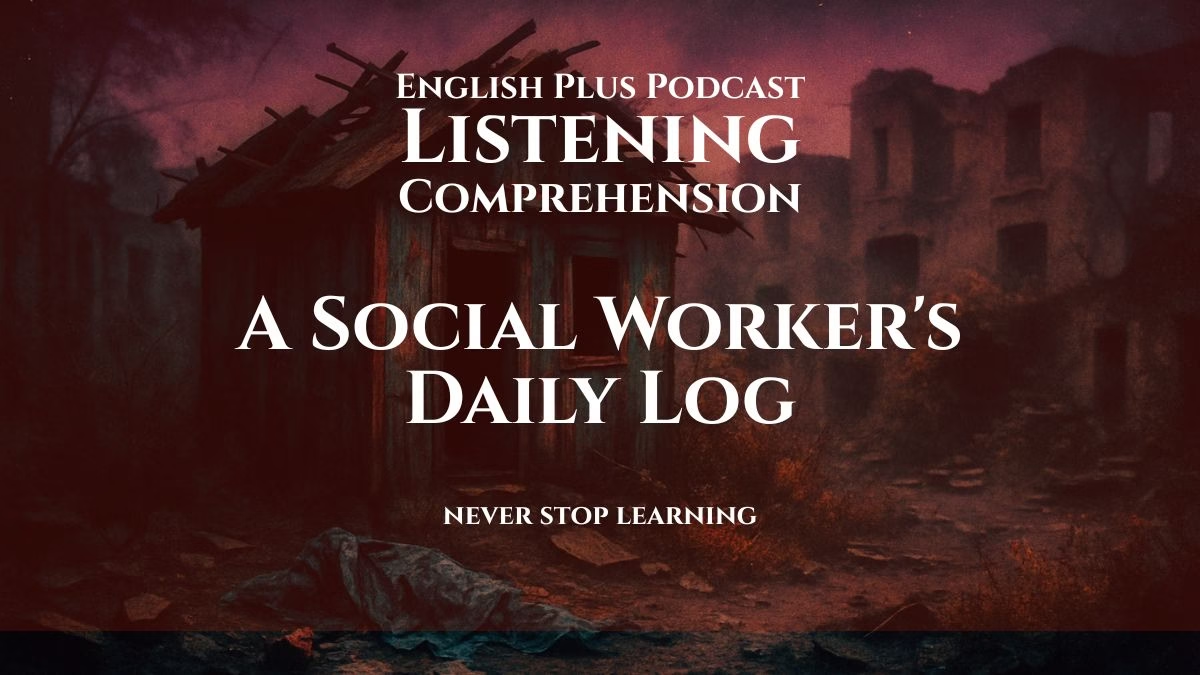How to Listen Like a Pro
Hello! Welcome to this listening practice. The audio you’re about to hear is a first-person narrative—an audio diary. This style is excellent for practicing one of the most important skills for any exam: understanding the speaker’s perspective. You’ll need to listen not just for facts, but for feelings, opinions, and motivations. Here are some tips:
- Listen for Tone: How does the speaker sound? Tired, frustrated, hopeful, determined? Their tone of voice (even in a scripted reading) tells you a lot about their attitude towards their work and the people they help. This is often a source for inference questions on exams.
- Connect the Dots: The speaker will talk about different cases or people. Your job is to find the common thread. What is the main challenge the speaker faces across all these situations? Identifying this overarching theme will help you grasp the main idea of the entire passage.
- Distinguish Facts from Feelings: The speaker will state facts (e.g., “the application was denied”) and express feelings (e.g., “it was incredibly disheartening”). Practice separating the objective situation from the speaker’s subjective reaction to it. This is a crucial skill for answering questions about the speaker’s attitude or purpose.
Listening Topic: A Social Worker’s Daily Log
You will now listen to an audio diary entry from a social worker named Sarah. She will be reflecting on the events of her day. As you listen, imagine you are hearing her private thoughts. She will discuss her clients, the challenges they face, and the complex systems she must navigate to help them. Think about the emotional and logistical difficulties a person in this profession might face every single day.
Key Words and Phrases
Here are some key terms from the audio log that will help you understand the nuances of the speaker’s work.
- Advocacy: This is the public support for or recommendation of a particular cause or policy. In the log, Sarah sees her job not just as helping, but as active advocacy for her clients’ rights and needs within a complex system.
- Bureaucracy: This refers to a system of administration, especially one in a government, marked by excessive paperwork and complex rules. Sarah talks about the “endless bureaucracy” as one of the biggest obstacles she faces.
- Resilience: This is the capacity to recover quickly from difficulties; toughness. Sarah expresses admiration for her clients’ resilience in the face of incredible hardship.
- Disheartening: This adjective means causing someone to lose determination or confidence. Sarah describes receiving a denial letter for a client as a disheartening moment in her day.
- Navigate: In this context, it means to guide a course through a difficult or complex situation. Sarah’s job involves helping her clients navigate the complicated systems of social support services.
- Stopgap measure: This is a temporary solution or fix used until a permanent one can be found. Sarah describes finding a spot in a temporary shelter as a stopgap measure, not a real solution.
- Systemic issues: These are problems resulting from issues inherent in the overall system, rather than due to a specific, isolated factor. Sarah reflects on how her clients’ problems are often symptoms of larger systemic issues like a lack of affordable housing.
- Rapport: This is a close and harmonious relationship in which the people or groups concerned understand each other’s feelings or ideas and communicate well. Sarah mentions the importance of building rapport with a distrustful teenage client.
- Eligibility criteria: These are the set of rules or conditions that must be met in order to qualify for a particular program or benefit. Sarah spends much of her time trying to prove her clients meet the strict eligibility criteria for aid.
- Vicarious trauma: This refers to the emotional residue of exposure to working with people as they are hearing their trauma stories and becoming witnesses to the pain, fear, and terror that trauma survivors have endured. Sarah alludes to this when talking about the emotional weight of the job.
Listening Audio
Listening Transcript: Please do not read the transcript before you listen and answer the questions.
October 19th. End of day. It’s funny, no matter how many years I do this job, I never quite get used to the quiet of my car after a day full of… well, noise. The noise of ringing phones, of other people’s stories, of my own thoughts trying to piece together solutions from a handful of mismatched parts.
Today was a day of paperwork and phone calls, a day of fighting the great, slow-moving giant of bureaucracy. My first appointment was with Mr. Henderson. He’s 78 years old, a widower, and has lived in the same small apartment for the last 35 years. Last month, the building was sold, and the new owners are raising the rent by an amount that is, for him, astronomical. He’s on a fixed income. There’s no stretch, no give. He showed me the eviction notice today. The paper was trembling in his hand, and I realized it wasn’t just his age; he was terrified.
We spent two hours on the phone with the city’s housing authority. The first person we spoke to transferred us. The second put us on hold for 20 minutes and then the line disconnected. When we finally got through to a third person, we were told he didn’t meet the eligibility criteria for emergency housing because the eviction date was still 30 days away. He had to be within 14 days of homelessness to qualify. I tried to explain the logic was flawed, that we should be preventing the crisis, not waiting for it to hit. But the person on the other end just kept repeating the rule. It was a perfect, maddening example of how the system is designed to manage a crisis, not prevent one. It was incredibly disheartening. I left Mr. Henderson with a list of subsidized senior housing complexes to call, but we both knew the waiting lists are years long. It felt like handing a life raft to a man in the middle of the desert. The most I could offer was a promise to keep fighting, to keep making calls. My job today was less about social work and more about being a stubborn, unyielding voice of advocacy.
Then, this afternoon, I met with the Ramirez family. Maria and Carlos have three young children, and Carlos lost his construction job two months ago. They’ve burned through their savings. They came to me for help applying for SNAP benefits—the food assistance program. Maria had tried to apply online but gave up, confused by the forms and the documents she needed to upload.
As we went through the application together, I was struck by their dignity. They weren’t asking for a handout; they were asking for a bridge to get to the other side of this crisis. Maria had every document organized in a folder—birth certificates, old pay stubs, letters from Carlos’s former employer. She was prepared, intelligent, and capable. Yet the system had made her feel inadequate. We spent 90 minutes working through the portal. I had to help her navigate a dozen different pages, each filled with jargon and complex questions. It’s moments like these that make me so angry about the systemic issues we face. A family is in crisis, and instead of a simple, clear path to help, they are met with a digital obstacle course. By the time we hit ‘submit,’ Maria was in tears, but this time they were tears of relief. That single click represented, for her, the possibility of a full pantry next week.
My last visit of the day was with Leo. He’s 16, and he’s been in the foster care system since he was ten. He’s a good kid—smart, funny, but he’s built walls around himself that are a mile high, and for good reason. He’s been in four different homes in the last six years. Today, we were just supposed to have our weekly check-in, but he was quiet. I could tell something was wrong. After a while, he finally told me he got into a fight at school. He said another kid was making fun of him for not having ‘real parents.’
My role in that moment wasn’t to be a case manager; it was just to listen. It was to validate his anger and his hurt. Building rapport with a kid like Leo is a slow, delicate process. You can’t push. You just have to show up, consistently, and be a stable presence in his whirlwind of a life. We didn’t solve anything today. I didn’t file any paperwork for him or make any official calls. We just sat there while he talked, and I listened. Sometimes, that’s the most important part of the job.
Driving home, I feel the weight of it all. The worry for Mr. Henderson, the quiet desperation of the Ramirezes, the profound loneliness of Leo. It’s easy to feel overwhelmed, to feel like you’re just applying stopgap measures to massive, gaping wounds in the fabric of society. You fight for one family’s food security, for one elderly man’s home, for one teenager’s sense of self-worth. You don’t win every battle. Today, I’m not sure I won any. But I’m also struck by the incredible resilience I witnessed. Mr. Henderson, despite his fear, is still trying. The Ramirezes, despite their hardship, are still a strong family unit. And Leo, despite everything he’s been through, is still willing to let someone in, even just a little bit. That’s what keeps me going. That, and the belief that showing up is, in itself, a victory. I’ll be back tomorrow to do it all again.










0 Comments